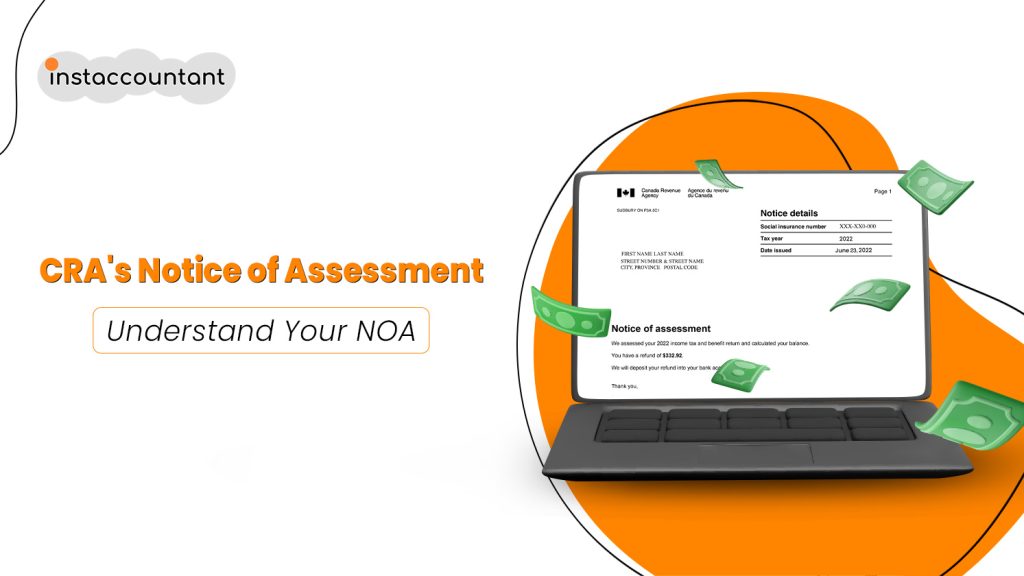
If you’re a Canadian taxpayer, you probably know that filing your tax return is not the final step in your tax obligations. After you submit your return, the Canada Revenue Agency (CRA) will review it and send you a Notice of Assessment (NOA). This is a document that summarizes your tax situation and tells you if you owe any taxes or if you’re entitled to a refund. But what does your notice of assessment mean and how can you deal with it?

In this blog post, we’ll help you understand your Notice of Assessment (NOA) and how it affects your tax situation. We’ll also give you some tips on how to file an objection or a request for reassessment if you disagree with the CRA’s calculations. This is a valuable information for anyone who wants to stay on top of their taxes and avoid any penalties or interest charges.
A Notice of Assessment (NOA) is a document that the CRA sends you after they process your tax return. It summarizes the information from your return, such as your income, deductions, credits, taxes paid, and taxes owing or refundable. It also shows any changes that the CRA made to your return, such as adding or removing income or expenses, applying penalties or interest, or adjusting your refund or balance due.
Here are some of the key sections of a notice of assessment that you should pay attention to:
The Notice of Assessment is an important document that you should keep for your records. It can help you plan your finances, apply for Canadian benefits or credits, or file an appeal if you disagree with the CRA’s assessment.
If you are signed up for a CRA My Account or My Business Account, you can access your Notice of Assessment (NOA) online as soon as it is available. This is faster and more convenient than waiting for a paper copy in the mail. You can also view your past NOAs for up to 10 years.
To access your Notice of Assessment online, follow these steps:
When you receive your notice of assessment, you should compare it with the tax return that you filed. You can use the summary page of your return as a reference. You should look for any differences in the following items:
If everything matches, it means that your return was assessed as filed. This means that the CRA accepted your calculations and did not make any changes. In this case, you don’t need to do anything else, unless you want to change something on your return.
If something does not match, it means that your return was reassessed. This means that the CRA made some adjustments to your return based on their own information or verification. In this case, you should read the explanation on the notice of assessment carefully and see if you agree with the changes.
Sometimes, the CRA may make a mistake or overlook something on your return. For example, they may have missed some income slips that you reported, or they may have applied a wrong rate or limit to some deductions or credits. If this happens, you have the right to dispute their assessment and ask them to correct it.
The first thing you should do is contact the CRA and explain why you think their assessment is wrong. You can call them at 1-800-959-8281 for individuals or 1-800-959-5525 for businesses. You can also send them a letter or use the “Change my return” service on your CRA My Account or My Business Account.
You should provide any supporting documents or evidence that can prove your point, such as receipts, invoices, bank statements, contracts, etc. You should also keep copies of everything that you send to the CRA for at least 6 years.
You have 90 days from the date of your notice of assessment to request a change to your return. The CRA will review your request and send you a new Notice of Assessment with their decision. If they agree with you, they will adjust your refund or balance due accordingly. If they disagree with you, they will explain why and give you options to appeal further.
Your Notice of Assessment (NOA) is more than just a piece of paper. It is a record of how much tax you paid or owe to the government. It can affect your financial situation, your eligibility for benefits or credits, and your rights as a taxpayer.
That’s why you should always check your notice of assessment carefully and make sure it matches your tax return. If it doesn’t, you should contact the CRA as soon as possible and ask them to fix it.
If you need help with understanding or dealing with your notice of assessment, I can help. I am a professional tax accountant with years of experience in helping Canadians with their taxes. I can help you file your return, access your NOA, review your assessment, and resolve any issues that may arise.